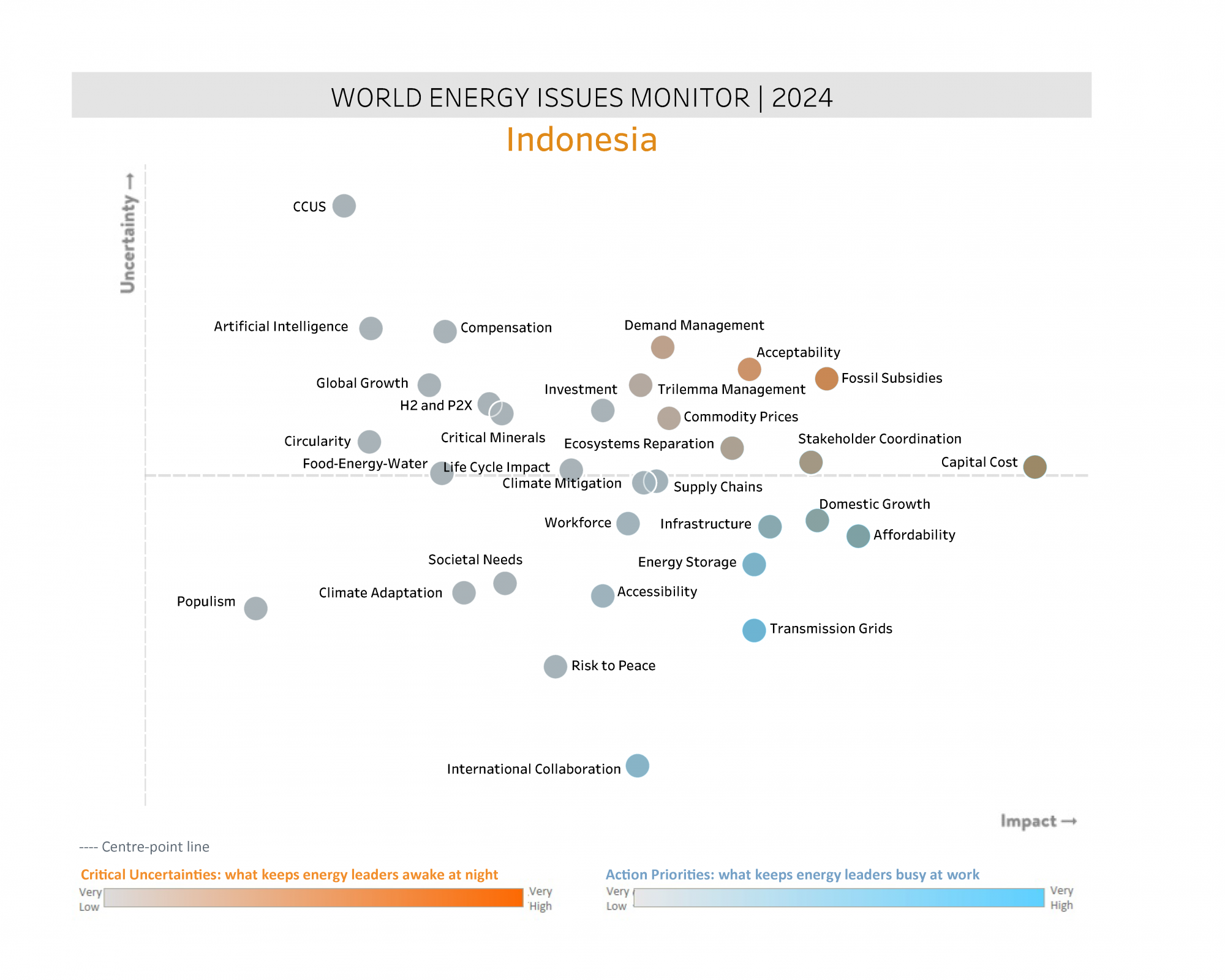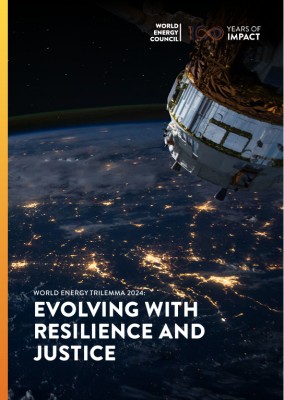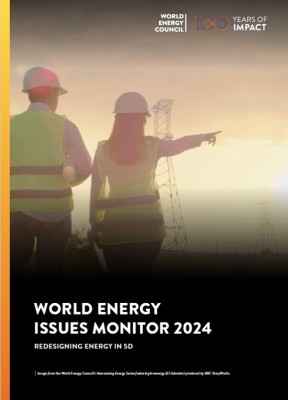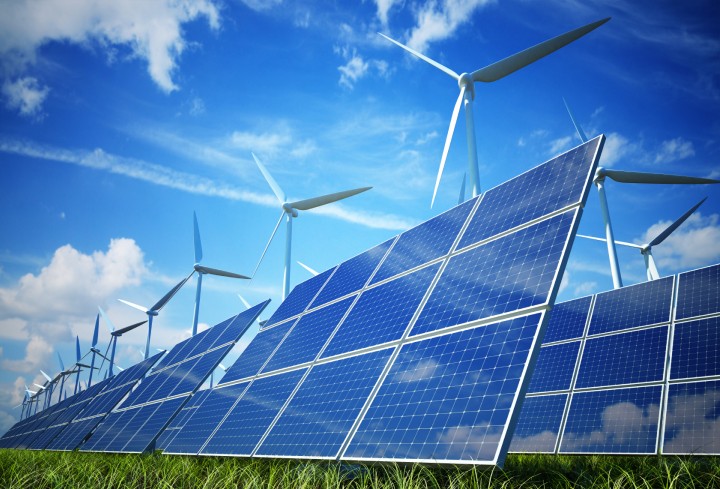The Indonesia National Committee aims to promote sustainable energy development in Indonesia, as a part of the World Energy Council’s energy vision. As a member of the World Energy Council network, the organisation is committed to representing the Indonesian perspective within national, regional and global energy debates. The committee includes a variety of members to ensure that the diverse energy interests of Indonesia are appropriately represented. Members of the committee are invited to attend high-level events, participate in energy-focused study groups, contribute to technical research and be a part of the global energy dialogue.
Hardiv is currently Chairman of the Indonesian National Committee-World Energy Council; Member of Scientific Board of the Agency of Research & Development Centre for Energy and Mineral Resources, Ministry of Energy and Mineral Resources of Indonesia; Member of Asia Pacific Energy Research Centre Advisory Board, Japan; Member of External Advisory Board of the Electrical and Systems Engineering Department, School of Engineering & Applied Science, Washington University, USA; Member of Studies Committee of World Energy Council; and Member of Indonesian Delegation for the COP, the CMP, and the Subsidiary Bodies of the UNFCCC. He was the Executive Director of the ASEAN Centre for Energy from 2011 to 2014, a Senior Advisor to the Indonesia State Electricity Corporation from 2003 to 2009, and Planning Director from 1998 to 1999 and from 2001 to 2003. Prior to these, he was the 1st General Manager of Transmissions and Java-Bali Control Centre. He received an Engineer degree in Electrical Power Engineering from the Bandung Institute of Technology, Indonesia; M.Sc degree in Electrical Engineering from Union College, USA; and D.Sc degree in System Science and Mathematics from School of Engineering and Applied Science, Washington University, USA. He participated in the Executive Program on Macroeconomic Policy and Management, John F. Kennedy School of Government, Harvard Institute for International Development, USA. He is a member of IEEE, SIAM and AMS. His main interests are Energy and Climate Change on Mitigation Actions for Sustainable Energy Development; Long-term Energy Planning; Power System Planning, Operation and Control; Power Project: Legal, Financing, Operational and Technical aspects in Commercial Engagements.
Energy in Indonesia

Indonesia's energy transition has seen some significant changes since it last took the World Energy Issues Survey in 2019.
Changes in Results:
- Indonesia targets to reach Net Zero by 2060 or sooner.
- The focus on renewable energy has intensified. The national electricity plan prioritizes renewables for the first time, and the use of biodiesel (B35) is expanding to reduce reliance on fossil fuels.
- There's a growing recognition of the need to move away from coal and phasing out coal to peak emissions from the power sector by 2030.
Reasons for the Changes:
- The urgency of addressing climate change has grown internationally. Indonesia's participation in initiatives like the Paris Agreement reinforces this shift.
- Clean energy is seen as a driver for economic growth and development. Reaching advanced economy status by 2045 is linked to the energy transition.
Challenges Remain:
- Indonesia needs to ensure a smooth transition that doesn't hinder economic development. A just transition that considers affected communities is crucial.
- The shift to renewables requires significant investment. Continued international support and mobilizing domestic resources will be key.
- Indonesia's energy transition shows a positive shift towards achieving net zero emissions. The reasons behind this change are a combination of global pressures, economic considerations, and international collaboration. However, navigating the challenges remains crucial for success.
Country trends over the last 5 years
Over the last 5 years, Indonesia has made significant progress in its energy transition towards cleaner and more sustainable sources of energy. Some key trends that have been observed include:
a. Addition of renewable energy capacity over the last 5 years accounted to 3.322 MW from 9.833 MW in 2019 to 13.155 MW in 2023, that consist of wind (154 MW), solar PV (573,8 MW), geothermal (2.417 MW), hydro (6.784 MW), and coal gasification (30 MW).
b. Several regulations have been launched in 2023. In early 2023, the Ministry of Energy and Mineral Resources (MEMR) launched carbon trading particularly in power sector, reinforced with carbon exchanges in September 2023. The Government of Indonesia has also issued regulations in 2024 regarding the Revision of Ministerial Regulation on Rooftop Solar PV.
c. Indonesia has been expanding access to clean energy through the deployment of off-grid renewable energy solutions such as: provision of nearly 21 thousand units of portable batteries for households far from the electricity grid, almost 1 thousand solar power plants for rural electrification with more than 28 thousand kWp capacity, and 62 units of micro-hydro power plants with more than 5 thousand kWp capacity
d. Phasing out coal and transitioning to cleaner sources of energy remains a challenge, especially given the country's abundant coal reserves and still heavily relies on coal for its energy needs.
e. The trends in Indonesia's energy transition over the last 5 years have been positive, with increasing investment and policy support for renewable energy. However, there are still challenges to overcome, particularly in phasing out coal and accelerating the transition to cleaner sources of energy. The transition is ongoing and efforts are needed to ensure that it continues to accelerate in the coming years.
Emerging leadership on integrating people and communities
Indonesian government's efforts to promote renewable energy development and increase access to clean energy for all citizens. Additionally, there are a number of non-governmental organizations and community groups in Indonesia that are working to raise awareness about the benefits of renewable energy and empower local communities to participate in the energy transition by providing training and resources to help communities develop their own renewable energy projects, such as solar panels and micro-hydro systems.
There is a growing recognition in Indonesia of the importance of involving people and communities in the energy transition, and leaders from government, civil society, and the private sector are working together to ensure that the transition is inclusive and benefits all Indonesians.
Insights for decision-makers
The results of the World Energy Issue Survey show that commodity prices is the one of the uncertainty issues in the world. In the context of Indonesia, commodity prices send mixed signals for the country’s energy transition, with both opportunities and challenges to consider for a faster, fairer, and more far-reaching approach.
Opportunities:
- The rise of commodity prices can benefit Indonesia's mining sector if it can develop these resources sustainably.
Challenges:
- Fluctuations in commodity prices can make project costs unpredictable. This can hinder large-scale investment.
- The surge in demand for clean energy materials can strain supply chains, potentially leading to shortages and driving up prices of these materials.
- Rapid transition away from fossil fuels could lead to job losses in the coal and oil sectors. A just transition plan that supports affected communities is crucial for fairness.
Strategies for a Faster, Fairer, and More Far-Reaching Transition:
- Indonesia can explore partnerships with other resource-rich countries to mitigate dependence on any single source for clean energy materials.
- Sustainable domestic production of clean energy materials can create jobs and reduce reliance on volatile global markets.
- Developing robust recycling programs for renewable energy components can lessen dependence on virgin materials and price fluctuations.
- Investing in programs that equip workers with the skills needed for the clean energy sector can ensure a just transition.
- Strategic use of subsidies can make renewable energy more affordable and incentivize wider adoption, particularly for low-income communities.
Insights from Commodity Prices:
- Rising prices of fossil make renewable energy sources more economically attractive. This strengthens the case for increased investment and policy support for renewables.
- High prices for critical minerals highlight the need for strategic investment in securing a sustainable supply chain. This could involve partnerships or local exploration and mining with strong environmental and social safeguards.
- Concerns around potential price manipulation or unethical sourcing of critical minerals necessitate robust transparency measures throughout the supply chain. Collaborations with other countries and industry players can promote responsible sourcing practices.
Policy and Ecosystem for a Just Transition:
- Commodity price volatility can disproportionately impact low-income populations. Consider targeted subsidies or social safety nets to mitigate the impact of rising energy costs during the transition.
- The shift towards renewables will require a differently skilled workforce. Invest in training programs to equip workers with the necessary skills for the new energy landscape.
- Transparency and open communication are key. Proactively engage with communities potentially affected by the transition, such as those reliant on fossil fuel industries. Address concerns and involve them in the planning process.
Acknowledgements
Indonesia Member Committee
Downloads

Indonesia World Energy Trilemma Country Profile
Download PDF
World Energy Trilemma Report 2024
Download PDF
World Energy Issues Monitor 2024 Indonesia Country Commentary
Download PDF





